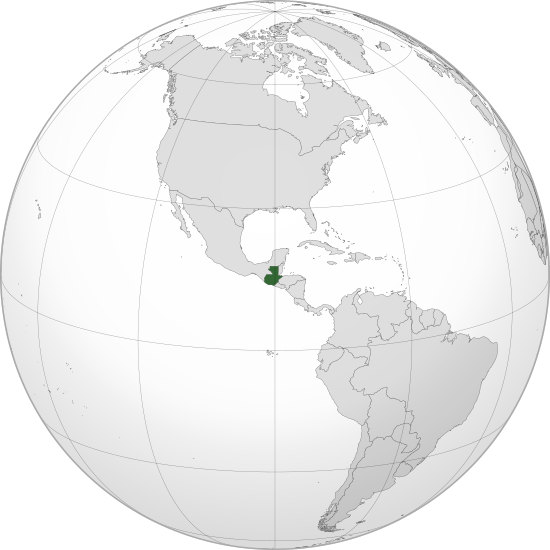
Today, more than 10 years after the UN brokered peace accords were signed, it is painfully clear that the armed struggle of the guerilla did not bring the end of the inequallity and oppression of the poor and indigenous population any nearer.
When the special UN envoy Rodolfo Stavenhagen, visited Guatemala in February, he told in an interview in La Prensa Libre that the current situation depressed him. Nearly no progess has been made to improve the situation of the Mayan population.
Me myself I got a bit of a blow after visiting Victor his family. Victor is working for CEIBA (the local branch of the International Friends of the Earth network) and we interviewed him at home for the documentary. After the interview, he showed us some pictures from his past. Victor fought 18 years in the Guerilla as a sub-commandante.
Victor his house is the kind of house you mostly see in Guatemala. Bare concrete bricks and a metal roof on top of it. We hung around a bit and talked to the other family members. His father barely survived one of the massacres committed by the army. He told it with a soft expression on his face.
Victor has two daughters. We asked his oldest daughter, who is 16, about her studies. "Right now I am not studying she told us, I am working", "Ah, so then you are earning a bit of money". Se had a mixed expression on her face, and we saw a painful expression on Victor his face too. Both glanced at each other. "Not really she says". She earns 12 Quetzal a day at the tortilleria where she is working from 7 in the morning untill 7 in the evening. FYI, that buys you just one beer here in Guatemala (in the cheapest places), and is worth 1,2 Euro.
Victor told us that they don't have the money to let his daughter continue her secondary studies ("diversificados"). He put his head to the table for a second, his wife put her arm on his shoulders.
I guess by that time I also had a painful expression on my face. I told how
difficult it is in Europe to make people understand that our material wealth depends on the poverty in countries such as Guatemala. And how easy it is for people in Europe to shove this aside as communist propaganda, which to them is equivalent as Stalin and dictatorship.
When Aline and I left, his wife and daughter gave us a artisan made little bag. We spend only four hours in their home, we arrived with empty hands, they gave us drinks and food, and a gift when we left.
When we arrived at one of the CEIBA offices to go to sleep, I imagined how it must feel to fight 18 years in the Guerilla for a better life for your people, and that more than 10 years after you put down arms, you find yourself your daughter working for 1 Quetzal an hour, because education is too expensive.
It made me angry when I read an advertisement in La Prensa Libre from the Chambre of Agriculture and industry claiming that the plan from the current government, to slightly raise taxes and spend more on e.g. education and the police will create more poverty.
Today we are in Rabinal, one of the places where the violence and army massacres hit the people hardest. Mario, the president of the "Madre Tierra" organisation which is working on agro-ecology in the Rabinal surroundings, told about the work his organisation is doing, mainly working with women, widowed during the armed conflict.
Mario told us that taking up the arms did not bring them any further. He himself is from Rio Negro, a village which was displaced during the armed conflict, and afterwards flooded by the water for a major hydro-electric dam.
Aline and I visited the museum here in Rabinal which is dedicated to the story of the armed conflict in the Rabinal area. The museum basically is a collection of enlarged ID card pictures from a number of the victims, with a short story about their life and death. In a display you can see the necklace from one of the women which were excavated from a mass tomb. Next to the necklace there is the hat from Rios Mont, the military dictator who was governing the country in the beginning of the eighties, when most of the massacres took place.
Rios Mont, who is still enjoying the comfy seats of the Guatemalan Congress, payed a visit to Rabinal in 2003 during his election rally. If you want to read a non-fiction political thriller, here is the story about Rios Mont on the wikipedia site.
Above the hat the people from the museum put a title "the day of dignity from Rabinal": Rios Mont lost his hat when he was chased away by the people from Rabinal, who threw rocks at him.
There is also a little paper explaining the extraordinary quality of the hat...





